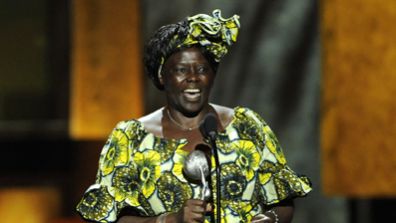Human Rights of Women
Last month, ovarian cancer claimed another dynamic woman, 71 year-old social activist, ecologist and Nobel Laureate, Wangari Maathai.
Born in 1940 in Nyeri, Kenya, Maathai attended school during a time when few Kenyan girls were educated. Although hardly known in the U.S., Maathai received a master’s degree in biology from the University of Pittsburgh before returning to Kenya where she earned her Ph.D. – a first for an Eastern African woman – from the University of Nairobi and began advocating for women’s rights and environmental conservation.
To call Wangari Maathai an over-achiever would be an understatement. Defined by words like visionary, trailblazer, courageous humanitarian and conservationist, Dr. Maathai leaves behind an illustrious and inspiring legacy.
In 1972, Professor Maathai created the United Nations Environment Programme (Unep). Always devoted to her homeland, Maathai also founded the Green Belt Movement in 1977 and began a crusade against African deforestation that resulted in the planting of 45 million trees throughout Kenya.
By the early 1990s, Maathai’s influence, popularity and pro-democracy activities made her the target of the Kenya’s oppressive and corrupt government. Beaten, jailed and the subject of government inspired smear campaigns by the media, Maathai endured years of intimidation and false accusations. Her name was even included on an assassination “hit list” along with other activists.
Despite the threats and daunting obstacles one can only imagine what a Kenyan woman would endure in a male-dominated society; Maathai remained a strong willed, tireless advocate. An admirer of Dr. Martin Luther King’s nonviolent civil rights movement she was also a consummate optimist. She is credited for changing the lives of tens of thousands of women in her homeland and was a force to be reckoned with when it came to human rights, equality and the environment.
Following an unsuccessful presidential campaign, Maathai helped create the Mazingira Party – which means environment in Kiswahili – and eventually won a seat in Kenya’s Parliament in 2002 where she continued to advocate on the issues that brought her international recognition and respect.
Wangari Maathai was an exceptional woman of perseverance, courage and conscience. Her contribution to humanity and the environment was deemed so extraordinary she became the first black African woman to be awarded the Nobel Peace Prize in 2004 for her “contribution to sustainable development, democracy and peace.”
Maathai’s inspirational memoir, Unbowed, chronicles her remarkable journey and the many challenges she endured in bringing change to the people and the country she loved so much.
I met Wangari on a few occasions. She had the most indelible smile. I will always remember "that" smile, optimism and enduring beautiful spirit.
Africa has lost a rare treasure. But Maathai’s life work will undoubtedly live on, inspiring generations of visionaries willing to challenge authority and fight for a better, sustainable future.

